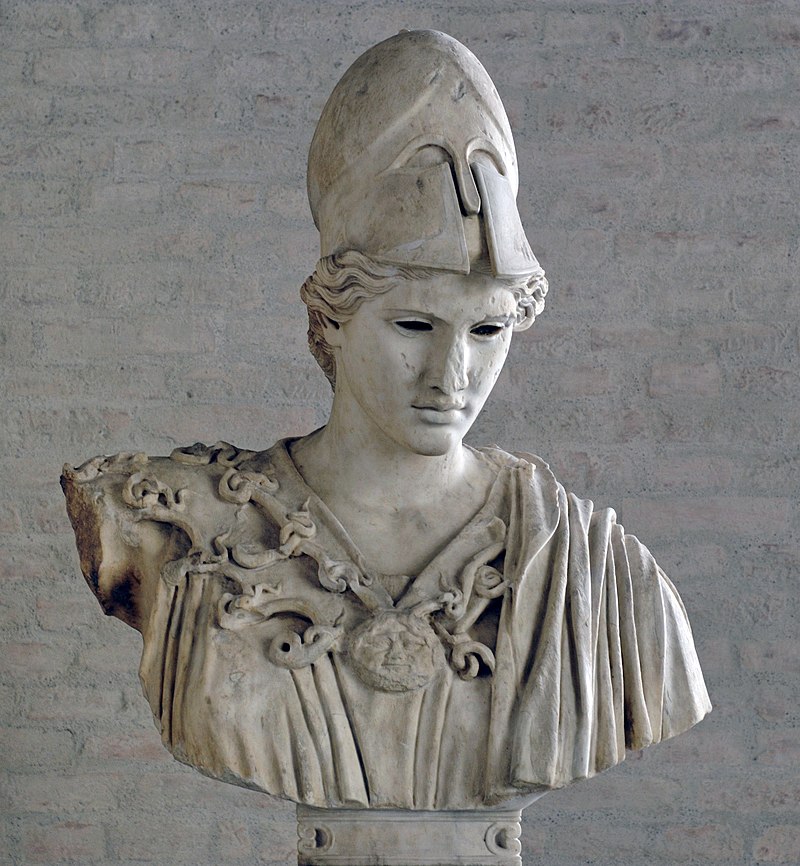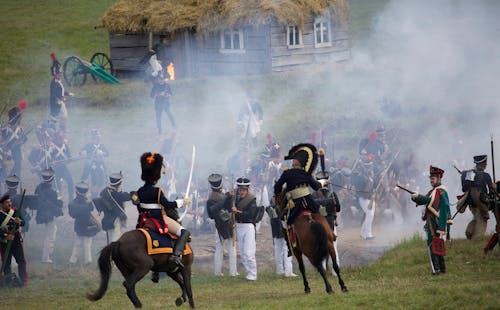
Between 800 BCE and 500 CE, the ancient Greek civilization developed a body of philosophical concepts and ideas which greatly influence military leaders throughout history. Many of the current philosophy and theories of modern warfare known to us today owe their foundations to ancient Greek thought. The ancient Greeks had two different gods of war — the wise goddess Athena and the bloodthirsty god Ares. The mere fact that, out of twelve Olympian gods, two deities are devoted to armed conflict indicates the important role warfare played in the social order and the fabric of daily life in ancient Greece.
However, despite their dominion over the same subject, Ares and Athena were far from a brother-sister team. In fact, in all of Greek Mythology, no siblings seem to hold a worse grudge against one another than the two war deities. The Ancient Greek society, in turn, did not hesitate to pit them against one another in their belief, their stories and their worships. What is considered by many to be a simple mythological sibling rivalry is actually a more complicated web of differences which culminated into the religious and military rivalry between the Greek cities of Sparta and Athens which resulted in the Peloponnesian War in 431 BCE.

It is helpful to start with what we already know from ancient and modern references – whereas Ares embodies strife and slaughter, Athena is the goddess of strategy and forethought. This is fitting as Athena, like most of the goddesses, seem to occupy a large part of her time with making plans and developing strategies to later having male gods or mortals execute them. On the other hand, Ares engages directly in combat. As a result of Ares’ and Athena’s different habits and viewpoints, honors were given to them by different parts of the society. Athena is usually regarded as the goddess of military leadership, protection and strategy, whereas Ares would be the deity that regular warriors prayed to for inspiration and bravery by soldiers.
References to Athena identified her as a protectress and a warrior of defense, as her most famous weapon is her shield. She is the warrior who is able to engage in civilized combat by using her fighting prowess for just causes. She is also the embodiment of resourcefulness, credited with the invention of a number of essential articles of battle, such as the bridle, which allows control of horses, thus greatly enhances efficiency of movements in battles. In the Illiad, It was on Athena’s advice that Odysseus implemented the use of the Trojan Horse.

On the other hand, Ares is cruel, bloodthirsty and aggressive. He wages offensive wars for nothing more than the sheer love of combat. His murderous reputation result in little respect that comes from fear rather than love or admiration.
The earliest sources for the names of Greek divinities are the tablets unearthed in the archives of the Bronze-Age palaces, such as Knossos and Mycenae. In these tablets, the names of a large number of Greek gods are recognizable. The names include Zeus, Demeter, Poseidon, Hermes, Athena, Hera, Dionysus, and Hephaestus. Also recognizable are the names of a number of lesser divinities, including some that somehow fell out of favor after the fall of the Mycenaean palaces. The only name not mentioned on the tablet was Ares. However, there is another name: Enyalius. Enyalius may have been a name for an earlier god of war or an indirect reference for Ares himself. The poet Archilochus of Paros, who lived around the middle of the seventh century BC, uses Enyalius as an alternate name for Ares. Homer also refers to Ares as Enyalius in book xx of the Iliad.
This indirect reference may not have been a coincidence. Ares has only a few myths and fewer temple cults compared to the other deities, and generally lacks the esteem granted to Athena. Lewis Richard Farnell describes Ares’ persona as “of less value for the social and religious history of Greece than any of the divinities hitherto considered” such as Zeus, Athena and Hera, which makes Ares a somewhat marginal figure for Greek religion.

The fact that Ares was the son of Zeus and Hera did not assist him in his position among the Olympian gods. There is a famous passage in the Iliad where Zeus, his own father, refers to Ares as the god that he hates the most, “To me you are the most hateful of all the gods who hold Olympus. Forever quarreling is dear to your heart, wars and battles.” (5.890–891)
Soon after Athena’s birth, she became a challenge to Ares’ place on Olympus as the god of war. The intelligent strategy which Athena gave to Greeks threatened Ares’ success in warfare, and Ares’ brutal manners would result in proper Greek society disowning him over time. It soon became apparent how stark the preference given by most Greeks to Athena over Ares. Stories of the two deities locked in battle inevitably result in victory for Athena. This gives us an insight of the ancient Greek’s general philosophy of war: Careful and strategic killing is applauded while uncontrolled bloodshed is shunned.
However, not all of ancient Greece share these sentiments towards Ares. In poetry, warriors were referred to as “henchmen of Ares”, and the grave of Arniadas, who died around 600 BC on the island of Corfu, had a three line hexameter with a reference to man-slaughtering Ares: “This is the tomb of Arniadas whom flashing-eyed Ares destroyed as he fought beside the ships in the streams of Arathus. He was the bravest by far in the wretchedness of war.”

Many similar epigrams emphasize the ferocity of Ares as a god of slaughter. However, the ancient Greeks associate Ares with what they consider to be the “less civilized” parts of their world. Therefore, Ares can often be found in Thrace – the area along the northern edge of the Aegean basin. Euripides calls Ares the patron deity of Thrace and Herodotus mentions that the Thracians only worshipped Ares, Dionysus, and Artemis, with the exception of their kings, who venerate Hermes.
Ares was also associated with nomadic horse-people. According to Herodotus, the Scythians worshipped Ares by sacrificing animals and captives to a sword stuck into a pile of brushwood. Ares was also considered the father of the Amazon women – their queen was said to be a descendant of the god of war himself.
The idea of dividing domains in the world of the divine dates back to Homer’s time as he mentions in the Iliad that matters of war are the concern of Ares and Athena. The concept of a divine division of spheres of influence was evidently already very popular in Plutarch’s day as he reinforces the view that each of the gods has his own field of action. This description is complemented by Lucian, who adds that the gods have no quarrel with the honors allocated to them. Therefore, Athena, the goddess of wars does not argue with Artemis over hunting, and Artemis, in turn, yields to Athena in military matters.

However, at the same time, also through the story of the Illiad, Homer himself argues that the concept of war as the domain of Ares and Athena is merely a declarative form and all of the gods are engaged in military activities. Two sacred characters of war (brutal military force as personified by Ares, and just war under the patronage of Athena) were determined to introduce some order into the rather complex Greek polytheistic system while still acknowledging the role of Zeus and the guardian deities of the cities as the givers of military victory.
In martial contexts, Greek authors often included the concepts of theos (gods), daimonion (divine beings) and hieros (holy power) which signify interference by unidentified divine forces. In inscriptions from the Hellenistic period many divine beings appear in the role of separate patrons of war. References to Zeus in this case may often mean a generalization of divine will, represented by Zeus in his capacity as the father of the gods. Therefore, Ares and Athena maybe the god and goddess of war in name only as the ancient Greeks created a concept of potential military engagement by all the gods. If one were to note the divine beings participating at least once in an ancient Greek war or battle, it would be an extremely long list.

The basis of this thinking can be sought in the basic definition of war – polemos. As Hesiod does not include war in his theogeny, it is not known when or how war emerged in the cosmogenic process. Although war is a force that is present in the world of the gods, it does not have clear contours and therefore not pictured so willingly. This may be a reason why later Ares is not referred to by name and is relegated to the more brutish part of the ancient Greece society.
War is only occasionally personified, and not always by Ares. Pindar gives war a daughter named Alala – the personification of a war cry. Heraclites ascribes Polemos the function of father and king of everything that exists and Aesop refers to Polemos as the husband of Hubris. Later, Polemos was given a sister – Enyo. The answer to the question of why Polemos never became a clearly defined divine figure and mythological hero leads us back to the Illiad, where many deities have military might and participate in directing martial activities. Therefore, “war” never became an independent concept. It arises as a result of what can be termed a divine “chain reaction” which is usually set in play by Zeus. The martial forces are transferred to the battlefield.

The existence of war therefore depends on the gods who activate it by a stimulus. In the Iliad, Zeus dispatches Athena to initiate neikos (strife). However, the most obvious illustration of the method of initiating the process of war is Zeus appearing in the role of parent to both Ares and Athena, deities of war. Until the 4th century BC this concept of Polemos referred mainly to war without limits in time, and this term was not used to refer to any specific war.
Ares, another definition of war, was probably nothing more than an abstract idea at the beginning. Even though Ares is a part of the divine genealogy, most of the gods have a grudge towards him. Sophocles calls Ares a god without honour. However, despite his status as an outsider, it is significant that Ares, just like Polemos, is not fully autonomous as other deities also carry out the “work of Ares”. One of the Homeric Hymns claims that the “work of Ares” was chosen by Athena. The name Ares is apparently significant enough to form many of the other gods’ epithets. Athena’s epithet Areia should be analyzed as such, as should Zeus’ epithet Areios and Aphrodite’s Areia. Euripides states that even the wine god Dionysus contains an element of Ares. It is worth noting that it is never stated that any deities contain an element of Athena.

